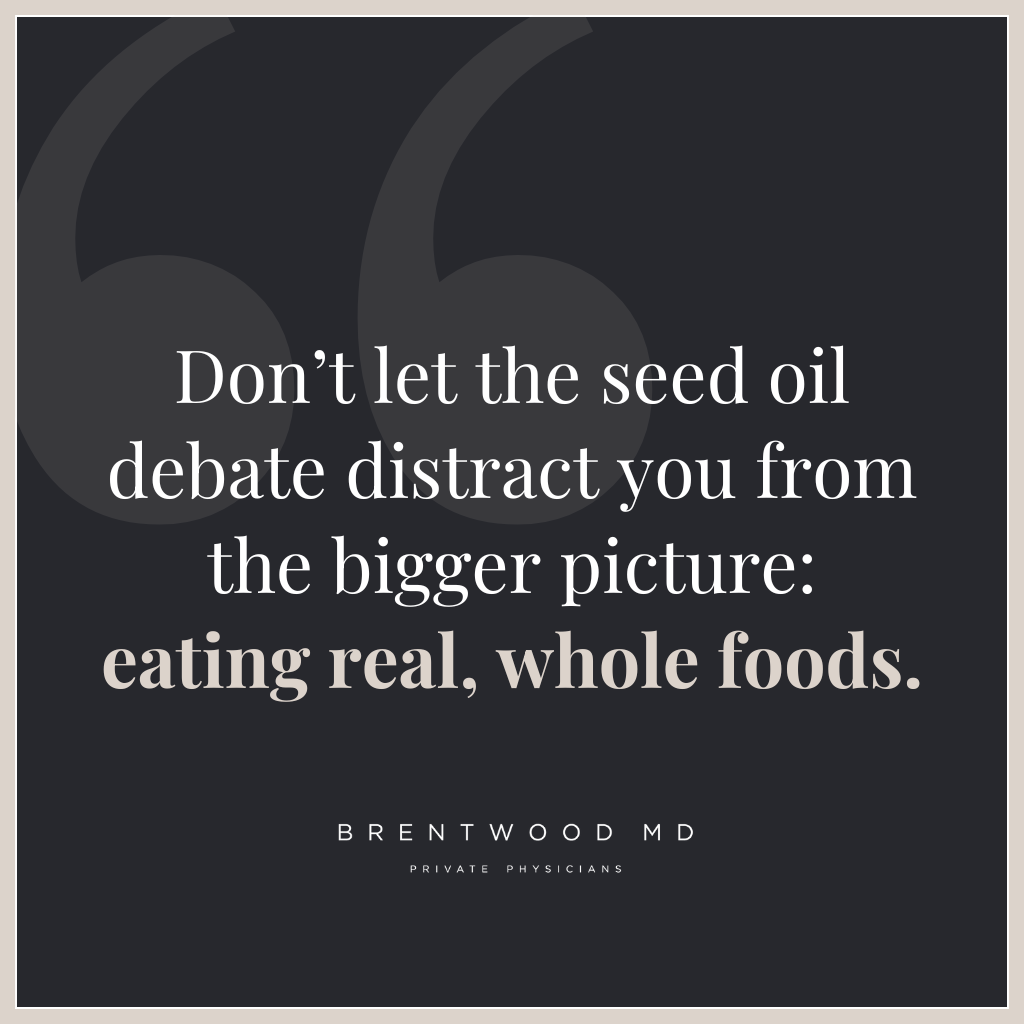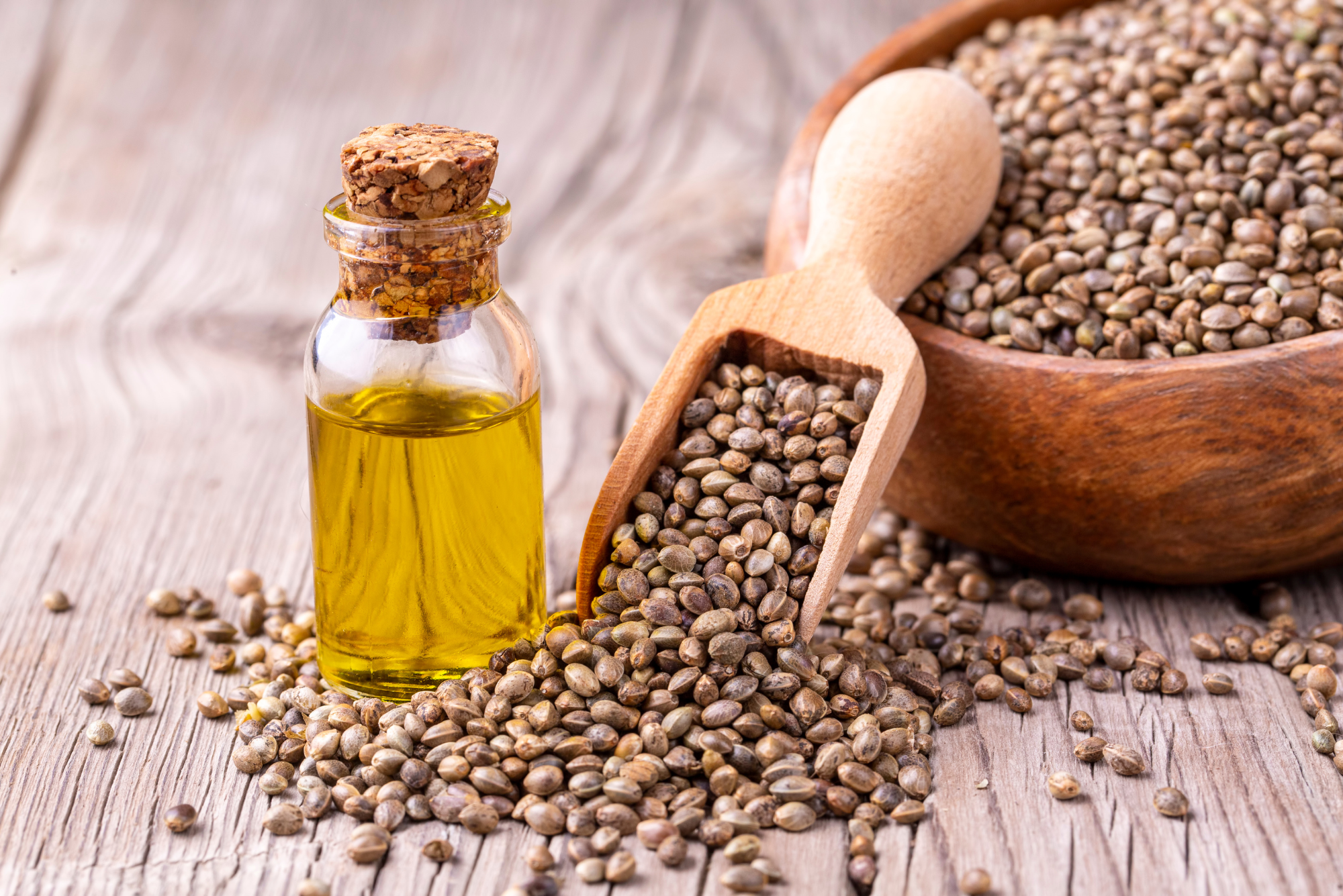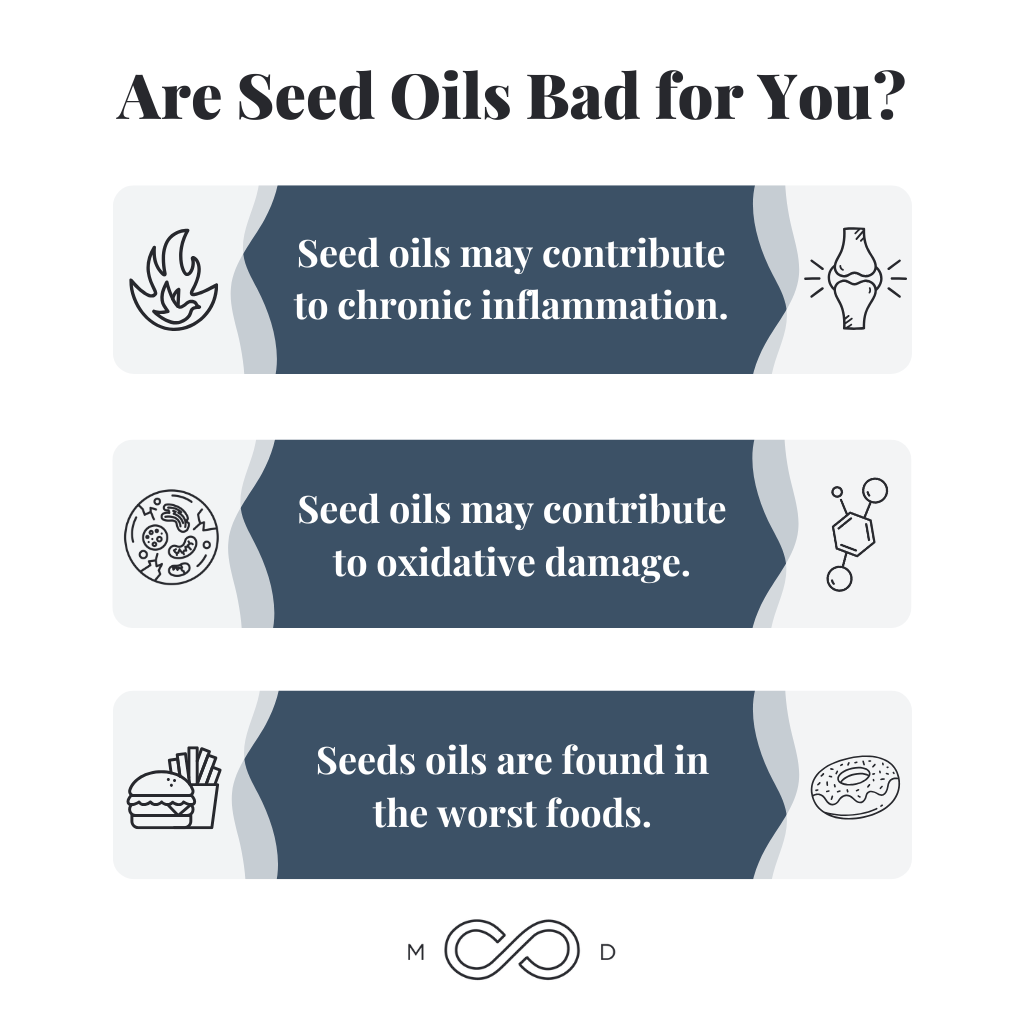You’ve probably heard something about the debate over seed oils in recent years. One side claims they’re a toxic poison destroying our health. The other insists they’re perfectly safe and even beneficial.
I don’t claim to be a seed oil expert. But, as someone who’s spent years helping patients navigate health optimization, I’m here to give you my honest take based on what I’m seeing so far:
Are seed oils bad for you? Probably, but the exact degree of harm remains unclear.
What Are Seed Oils and Why the Controversy?
Seed oils — like soybean, corn, canola, sunflower, safflower, and cottonseed oils — are extracted from seeds using industrial processes that involve high heat and chemical solvents. They’ve become ubiquitous in our food supply since the early 1900s, appearing in everything from salad dressings to fried foods.
The controversy stems from a simple observation: These oils weren’t part of the human diet for most of our history. And since they entered the food supply (along with other additions), diseases that were once rare have become common.
But here’s where it gets complicated. Most major health organizations still consider seed oils safe, often pointing to studies showing they can lower cholesterol levels. However, as I’ve discussed in my analysis of the traditional view of cholesterol and heart disease risk, simply lowering total cholesterol — or even total LDL cholesterol — doesn’t necessarily equate perfectly to cardiovascular health.
Why Seed Oils Are Likely Bad for You
Like many health topics, the seed oil debate has become frustratingly binary. People want them to be either completely good or completely bad. The reality is likely more nuanced. For instance, if seed oils are bad for you, how much do they affect your health? And in what quantities?
That said, here are some reasons seed oils have fallen under suspicion:
Seed oils may contribute to chronic inflammation. Because seed oils are so pervasive in the food supply, perhaps the top worry is that they promote chronic inflammatory processes in the body. The thought is that their high omega-6 fatty acid content throws off the healthy ratio of omega-6 to omega-3 in the body. This, plus the oxidative stress seed oils create during metabolism and storage, could contribute to inflammation.
Seed oils may contribute to oxidative damage. The industrial extraction process and chemical structure of these oils make them prone to faster oxidation, which — when consumed — can damage cells and contribute to aging and disease processes.
Seed oils are found in the worst foods. We find seed oils primarily in highly processed, packaged foods — the same foods we know contribute to metabolic syndrome and chronic disease. These products are stripped of nutrients, loaded with additives, and engineered to be hyperpalatable (read: addictive). So even if seed oils turn out to be perfectly fine, the foods they typically reside in are decidedly unhealthy.
The Emerging Hypotheses
Some researchers are now arguing that seed oils may directly cause insulin resistance. This theory suggests that consuming enough seed oils over time may independently trigger metabolic dysfunction, even without other dietary factors.
I’m keeping an eye on this research, but I’m not ready to make that claim definitively. The science isn’t settled, and correlation doesn’t equal causation. However, it’s worth paying attention to.
The Suspicious Historical Timing
One of the biggest factors that gives me pause is the rise of heart disease, cancer, diabetes, and other diseases alongside the rise of seed oils in our food system. Is this causation or correlation? We don’t know for certain, but I consider the timing striking enough for caution.
The Practical Reality: Focus on the Big Picture
So, are seed oils bad for you? Probably, at the very least, as a component of already unhealthy processed foods.
But if that’s the case, what do we do with this information? Here’s my recommendation:
Don’t let the seed oil debate distract you from the bigger picture: eating real, whole foods.
The most important thing isn’t obsessing over every gram of seed oil. Instead, I suggest focusing on foods that were available to your great-grandparents. When you do this, you automatically minimize your exposure to seed oils (and other “new” foods that correspond to the rise of obesity and chronic disease) while maximizing intake of nutrients your body actually needs.
In other words, if it wasn’t food 120 years ago, it probably isn’t food today.

With that in mind, you may also opt for oils that have been part of human diets for centuries when cooking at home:
- Olive oil for low-heat cooking and dressings
- Coconut oil for higher-heat cooking
- Avocado oil for versatile cooking needs
- Grass-fed butter for flavor and cooking
And in the grocery store, remember that when you see seed oils on an ingredient list, it’s often a red flag that you’re looking at a highly processed, factory-made product rather than real food.
Are Seed Oils Bad for You? My Honest Assessment
So, should seed oils be avoided? Probably, when possible.
Should you stress about every trace amount? No.
Are they going to single-handedly destroy your health? Unlikely — IF the rest of your diet consists mainly of whole foods.
The reality is this: Even if seed oils are bad, we don’t know exactly how much harm they cause or which people are most susceptible. What we do know is they’re found in the worst foods, and they weren’t part of traditional human diets.
So instead of getting caught up in the seed oil hysteria, focus on proven strategies:
- Eat real food. Shop the perimeter of the grocery store. Choose single-ingredient foods. Cook at home more often.
- Read labels. If a product has a long ingredient list with unpronounceable chemicals and seed oils, it’s probably not supporting your health goals.
- Address the root causes of chronic disease. Focus on optimizing your blood sugar, maintaining a healthy weight, getting quality sleep, and staying physically active.
- Don’t let perfect be the enemy of good. If you’re eating out and can’t avoid seed oils, don’t stress about it. One meal won’t derail your health, especially if you’re consistently making good choices otherwise.
The seed oil debate will likely continue evolving as more research emerges. Until then, I’m comfortable recommending caution without declaring disaster.
Stay curious, stay informed, and remember that whole, real foods are your safest avenue to a long and healthy life — without any controversy.

Dr. Aaron Wenzel is a concierge physician specializing in the care of fast-moving entrepreneurs, executives, and public figures in the Nashville, TN area. Dr. Wenzel’s diverse life experience and extensive training in family medicine, emergency care, nutrition, and hormone replacement therapies give him the unique platform to provide unmatched care for his patients.








